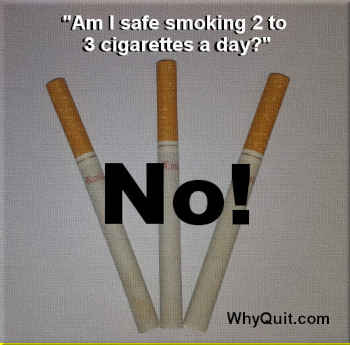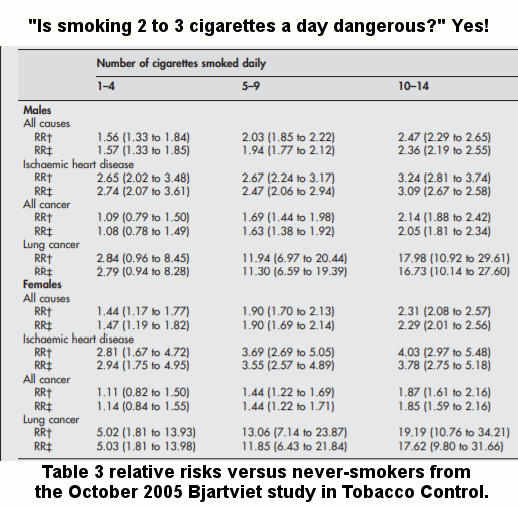
“Am I safe smoking 2 to 3 cigarettes a day?”
 The short answer: absolutely not.
The short answer: absolutely not.
And, sadly, believing such rubbish contributes to millions of light smokers continuing to damage and destroy normal blood flow, while building bigger and bigger cancer bombs, years after the moderate to heavy smoker awakens, gets serious, and quits.
The 2005 Bjartveit study examined the health consequences of smoking 1 to 4 cigarettes a day in a population of 23,521 men and 19,201 women, aged 35 - 49 years.
It found that as compared to never-smokers, the light smoker’s odds of dying from ischaemic heart disease were 2.74 times greater in men and 2.94 in women.
It also found that the risk of a 1 to 4 cigarette smoker developing lung cancer was 2.79 times greater in men and a disturbing 5 times higher in women (5.03).
Ischaemic heart disease, also known as coronary artery or coronary heart disease, is the gradual narrowing of arteries delivering life giving oxygen and blood to the heart.
Should an artery become blocked, a heart attack occurs. When that happens, the portion of the heart muscle serviced by the artery suffocates and dies. But how can a couple of cigarettes a day cripple or kill your heart?
Smoked nicotine activates the body’s fight or flight response, causing stored fats (energy) to be pumped into the bloodstream while shutting down bad cholesterol clean-up. At the same time, toxic carbon monoxide is damaging and gradually destroying the delicate lining of artery walls.
Over time, like a damaged non-stick frying pan, the unburned fats and extra cholesterol begin sticking to artery walls. As plaques begin building, a nicotine activated process (angiogenesis) secures, ties down and hardens the plaque by causing vessels to be grown through it.
This circulatory disease process also occurs within arteries delivering oxygen to the brain, resulting in elevated risks of stroke, even for light smokers.
On Monday, 52 year-old actor Luke Perry of "'90210" fame died of a stroke. Although well documented that Luke smoked in the 90s, and common for actors to keep hidden their smoking, youth smoking prevention and cessation advocates await confirmation from family and friends as to whether he remained a smoker.
WhyQuit's Stop Smoking Recovery Timetable shares findings as to how many years it takes for heart attack, stroke, cancer and other smoking related risks to return to those of a non-smoker.
“Well, what if I smoke only 1 cigarette per day?” The 2018 Hacksaw study combined and averaged the findings from 141 studies. Quoting the study’s conclusion:
“Smoking only about one cigarette per day carries a risk of developing coronary heart disease and stroke much greater than expected: around half that for people who smoke 20 per day. No safe level of smoking exists for cardiovascular disease. Smokers should aim to quit instead of cutting down to significantly reduce their risk of these two common major disorders.”
"Well, what about e-cigs, are they safe?"
The neo-nicotine industry wants to keep you enslaved and using until the day you die. No carbon monoxide, hundreds of fewer toxins, and only trace findings of a few cancer causing chemicals (not the up to 46 carcinogens in each cigarette puff), e-cig nicotine delivery appears inviting.
But let me remind you that until the 2005 Bjartveit study, smokers smoking 2 to 3 cigarettes a day had no idea that they were substantially increasing their risks of a heart attack, stroke, or of developing cancer.
It took 50+ years of smokers dying of lung cancer before the 1964 Surgeon General's Report linked smoking to causing it. And nearly every year since, research has linked smoking to some additional disease.
Today, according to the Surgeon General, “evidence has linked smoking to diseases of nearly all organs of the body. In the United States, smoking causes 87 percent of lung cancer deaths, 32 percent of coronary heart disease deaths, and 79 percent of all cases of chronic obstructive pulmonary disease (COPD).”
The point is, it may be decades before science has adequate long-term e-cigarette data to declare, to a reasonable degree of medical certainty, the health consequences of vaping or juuling. Until then, we can only guess.
Research guinea pigs in every sense, we have no idea of the consequences of inhaling vaporized nicotine into lungs already damaged by years of smoking. And what about hundreds of seemingly innocent e-liquid flavoring combinations, flavors intended to be consumed and digested, not pumped into the brain within 8 to 10 seconds of a puff?
As for the lure or dream of using e-cigs to wean yourself off of nicotine, think again. The 2018 Weaver study found that whether weaning is attempted by use of e-cigs, NRT or done unassisted (on-your-own gradual weaning), that stepped-down weaning approaches to quitting at least double your chances of failing to quit smoking.
It’s a finding lived and shared on March 6, 2019 by Katie Bryne, a nicotine dependent reporter for the Irish Independent.
"In a matter of months, my e-cigarette became more like a child's pacifier. Save for the times when it was charging, it was never far from my hands. I vaped while I worked. I vaped while I cooked. I vaped while I vaped," wrote Katie. "And I wasn't alone. I know dozens of people whose vaping habits have become compulsive; people who thought e-cigarettes could help them wean off nicotine but who actually ended up consuming more of the chemical than ever before."
Key to the light smoker successfully arresting their dependence is acceptance that they too are a real drug addict in every sense, that it's permanent, that in regard to chemical dependence that they are no different from the alcoholic or heroin addict.
While their brain’s level of nicotine tolerance is substantially less than the average smoker, their prison bars are just as real, and exactly the same. And should they succeed in breaking free they’ll remain on probation for the balance of life, always just one puff away from neuro-chemical captivity.
If fact, brain scan studies teach us that just one puff and up to 50% of dopamine pathway receptors become occupied by nicotine. While most who attempt cheating when quitting walk away feeling like they’ve gotten away with it, it isn’t long before they find their brain wanting, plotting to obtain or even begging for more.
Successful nicotine dependency recovery has but one determining principle. It’s that one puff would be too many, while thousands wouldn’t be enough. It’s that while one equals all and lapse equals relapse, that it’s impossible to fail so long as all nicotine remains on the outside.
Yes, only one rule … no nicotine just one hour and challenge at a time, to never take another puff, dip, vape or chew!
Related WhyQuit resources
Smoking's impact upon the lungs
"I'm just a little bit addicted"
"How can I be addicted, I can go hours without smoking"
Quitting smoking can make you calmer, happier and healthier
"But smoking is the only vice I have left"
"I can't quit" or "I won't quit"?
"It's my choice and I choose to use"
"Use relieves stress and anxiety"
"I can't drink alcohol without using nicotine"
"I'd gain weight and that's just as dangerous"
"My coffee won't taste the same"
Quitting by gradual withdrawal

